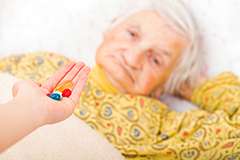Researchers to investigate overuse of antipsychotic drugs in dementia patients

Rutgers will take the lead in a three-year study that will investigate the effectiveness of federal and state initiatives to address overprescribing of antipsychotic medications for dementia patients in nursing homes.
Stephen Crystal, Board of Governors professor and associate director for Health Services Research at Rutgers' Institute for Health, Health Care Policy and Aging Research, is the principal investigator for the study, "Improving Medication Safety in Nursing Home Dementia Care." Crystal will work with regulators, patient advocates and other groups to track the progress of medication safety in each state.
The project's goal is to identify strategies to reduce the number of dementia patients in nursing homes who are receiving antipsychotic medications.
"Family members may not realize the kinds of medications their loved ones are receiving. Antipsychotic medications have a sedating effect that leads to inactivity and falls, and they have many serious risks," says Crystal, a professor at the Rutgers School of Social Work. The overuse of antipsychotics in the elderly also can lead to physical inactivity, more time in bed and pneumonia due to inactivity.
Antipsychotic medications, approved to treat serious mental illnesses like schizophrenia and bipolar disorder, carry an FDA Black Box warning reserved for prescription drugs that pose significant risk of serious or life-threatening adverse effects. Antipsychotics are particularly dangerous for elderly patients with dementia and have been found to cause an increased risk of death among nursing home residents.
The chance of a person with dementia receiving antipsychotic drugs in a nursing home is one in three, according to a March 2015 study by the Government Accountability Office. The study also found that 33 percent of those who had longer stays (over 100 days) were given a medication, compared with 23 percent of those who had shorter stays.
"The FDA has determined that there is a significant increase in the risk of death associated with these medications. While people with dementia may display behaviors, such as moaning and wandering and sometimes aggression, there is a high cost and health risk to managing these problems with antipsychotics," says Crystal.
Crystal says nursing home patients with dementia can benefit from a variety of interventions, from music therapy programs to warm relationships with staff members who interact with them. But too often, he says, dementia patients receive antipsychotics instead of interventions to help them communicate, engage them in activities and address their distress.
To find out a nursing home's antipsychotic use rate, Crystal recommends visiting Nursing Home Compare on Medicare.gov. This site combines all of the quality measures of nursing homes as reported by Medicare. If a resident in a nursing home is being given antipsychotic medications, Crystal recommends that family members speak with staff about limiting the duration and dosage and review the overall plan of care with the medical director.
"You, as the family member, are providing informed consent for your loved one to receive this treatment. It is your right to know what the compelling need is for this medication. Ask what else they have tried and when another medical review of the plan of care will take place. You can be an advocate for your loved one," Crystal says.



















